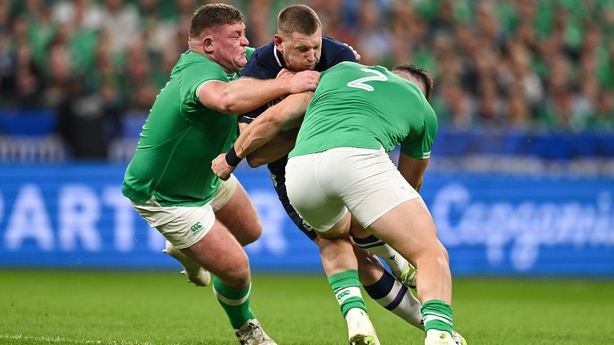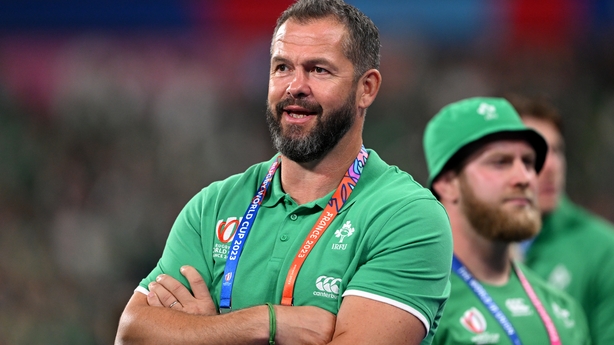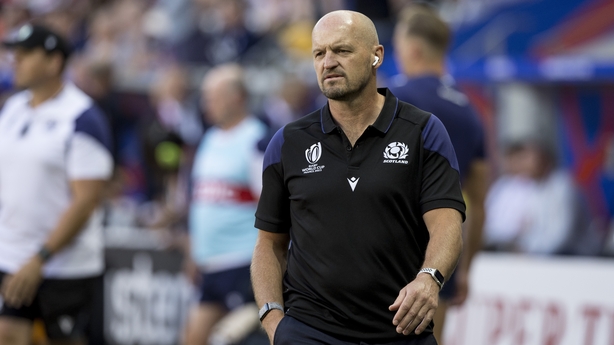With just under 15 minutes played at the Stade de France on Saturday Ireland had barely touched the ball, and yet their win against Scotland felt almost inevitable.
Leading 5-0 after James Lowe's try inside the first 60 seconds, Ireland were backed into a corner as Scotland briefly got on top.
A Caelan Doris high tackle gave the Scots the field position to attack while further penalties followed against Tadhg Furlong and Lowe.
It was off the lineout following Lowe's penalty that the game was effectively over. First Scotland went for the maul, but the Irish pack didn’t budge, and from there Scotland moved the ball wide. For 18 phases they held onto possession, and for most of those 18 phases they went backwards.
It was relentless defence from Ireland, who bullied their opponents even without the ball. When the turnover was eventually forced by Ireland, even at such an early stage of the game it felt like a turning point. Scotland had thrown 18 of their best shots at Ireland and barely put a scratch on them. When they next got back within a reasonable chance of scoring a try the score was 31-0.
"The work we'd done in that first-half set a brilliant foundation for the result," defence coach Simon Easterby said yesterday.

"It's been said before but I think this team understands how important the defence is to the overall success of the team. We work incredibly hard on being disciplined and not giving sides any access, and credit to the players, the way they go about their business and like you say, you can sense the feeling of excitement when the opposition have the ball, it's a chance for us to put a stop to their attack and take a bit of energy away from them as well.
"I think we saw that certainly in the first half when they had long periods of possession, our discipline was good and they didn't get a huge amount of gainline against us. But that's part and parcel of the game, players understand the value of defence, what it gives us as a team but also what it gives our attack then on the back of it."
While Ireland’s attacking game has drawn attention in recent seasons, it’s built on a foundation of an aggressive and miserly defence.
In the 2023 Six Nations they conceded just 14 points per game on average, while they’ve given up just 22 points in their two games against South Africa and Scotland at this World Cup, 14 of those coming when they were in cruise control against Scotland.
"Everyone says it, all over the world, that defence wins World Cups, and it certainly won us the first half this week, that's for sure," head coach Andy Farrell (below) said.

And the Ireland boss believes we’re seeing the benefits of their pre-season campaign which allowed them far greater time to fine-tune their defensive structure.
"When we're preparing for a normal competition, whether it be the Autumn Series or Six Nations, we have five sessions before we get into it.
"Our defence has always been strong but when you spend 15 or 16 weeks together, you'd expect every part of your game to get better, and it certainly has to keep doing that, to keep progressing in this competition."
A good defence can have a demoralising effect on an attack, and that quarter-hour defensive stand by Ireland was the perfect answer. It’s no coincidence that Scotland’s turnover was instantly followed by a scrum penalty, and when Ireland did cross for their second try shortly after it was quickly followed by their third.
For a game in which Ireland led 36-0 at one point and were barely under any significant pressure, their defence logged a whopping 195 tackles, with Caelan Doris and Josh van der Flier combining for more than 40 of those.
"You've just got to keep doing what you know you've got to do," Farrell added.
"It's tough at times because Scotland were threatening, throwing the ball around everywhere. I thought our systems were strong, our contacts were strong, and it's a sickening blow when you're attacking really well [to not score].
"We were able to keep them out and then at the other end of the field another seven points were on. It's a tough one to take [for Scotland], but that's what top level rugby is all about and that's something we've always strived for."

After the game, Scotland head coach Gregor Townsend (above) came under pressure for his players' decision to go for the corner rather than take a shot at goal and build their score three points at a time, but even with the benefit of hindsight it's hard to see how that would have rattled Ireland.
"I think if you saw the scoreline, three points wouldn't have helped us," Townsend said.
"We just needed to convert when we had the opportunities of the lineout, I think we got close to the try line on a couple of occasions and we didn't turn that pressure into five or seven points, and we would have needed five or seven points the way Ireland were playing."
Given how clinical Ireland were when they got the ball into their hands, giving up three points to a Scottish penalty would have done little to dent their confidence and the only way they were going to rock Ireland was through tries.
As mentioned by Farrell above, World Cups are won by defences, and his side's resolve will be given its biggest test yet next week by New Zealand, who are the last team that have truly ripped Ireland apart in that first Test in July 2022.
Follow a live blog of Ireland v New Zealand in the Rugby World Cup quarter-finals on Saturday with kick-off 8pm. Listen to live radio commentary on RTÉ Radio 1.


